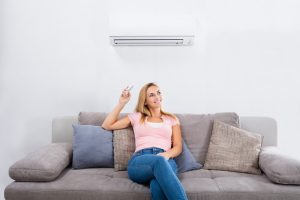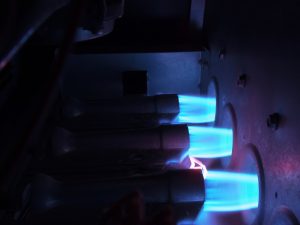Thermal energy is the natural movement from warm temperatures to colder temperatures creating energy in the change of temperature to the mass. A heat pump typically is a device that moves the air (or other matter) in the opposite direction from its natural flow.
A heat pump often uses an intermediate fluid called a refrigerant which absorbs heat as it vaporizes and releases the heat when it is condensed, using an evaporator to absorb the heat (or energy) from inside an occupied space and forcing this heat to the outside through the condenser. The key component that makes a heat pump different from an air conditioner is the reversing valve which allows for the flow direction of the refrigerant to be changed, allowing the heat to be pumped in either direction.
Timeless Technology
While mechanical movement of this energy, what we can actually call a pump, has been a relatively recent invention, the concept of this principal of physics has been in use since ancient times. Harnessing the power of geothermal energy (produced from the heat of the earth itself), natural hot springs “pumped” warm air into cool spaces in China and Europe thousands of years ago.
By 1852, Lord Kelvin had theorized the heat pump, but it took nearly 100 years to actually build one. In the last half century, the technological advances have made heat pumps part of our lives in many ways.
First Pump
In the 1940s a man named Robert Webber was motivated to build the first known heat pump while tinkering with his refrigerator. Accidently burning his hand on the outlet pipes of the cooling system, he was quite painfully awakened to an idea about the transference of heat.
Recognizing the freezer was constantly producing heat to cool its interior, he connected the outlet pipe to the storage tank of his hot water heater, extended that into a flow through pipes which heated air nearby, and then used a fan to blow the warmth into another room.
The first heat pump was a crude, but effective method to provide comfort. Creating a full-size version soon after, Wagner could heat his entire home.
Heat and Electricity
Today Portland heat pumps are built in many ways and shapes to heat or cool buildings of many sizes. Combined with geothermal forces close to the Earth’s surface or potentially deep within its fiery core, heat pumps are able to energize the turbines that can produce huge amounts of electricity
As technological improvements are refined during this time of climate change and dwindling fossil fuels, heat pumps promise to play an important part in our futures.
If you are interested in having a heat pump installed in your home, call Porland HVAC professionals Clean Air Act Inc.!



 Ductless mini split systems are becoming more popular by the day, but for the most part, most homeowners are still using ducted systems. These include systems like furnaces, central air conditioners, and standard heat pumps.
Ductless mini split systems are becoming more popular by the day, but for the most part, most homeowners are still using ducted systems. These include systems like furnaces, central air conditioners, and standard heat pumps. Do you know anyone in Portland, OR with a boiler? It’s not like they’re impossible to find, but they’re not all too common, either. Instead, you’ll find that forced-air heaters are much better suited to the needs of a typical Portland homeowner. They’re quite effective and don’t require a huge sum of money to install.
Do you know anyone in Portland, OR with a boiler? It’s not like they’re impossible to find, but they’re not all too common, either. Instead, you’ll find that forced-air heaters are much better suited to the needs of a typical Portland homeowner. They’re quite effective and don’t require a huge sum of money to install.
Join Us Online